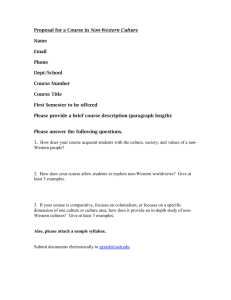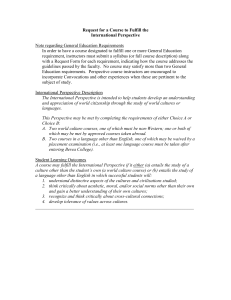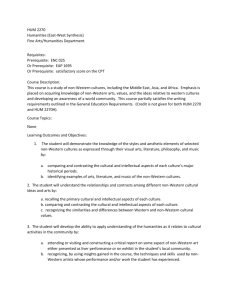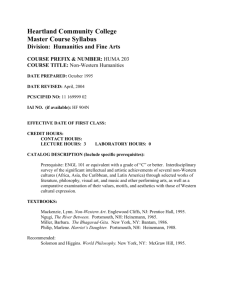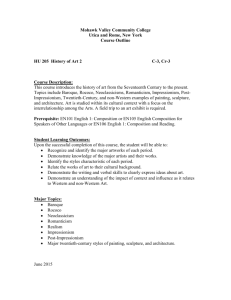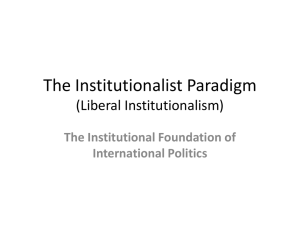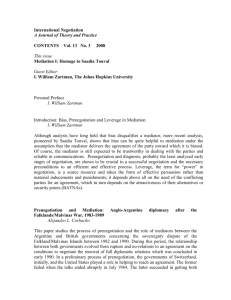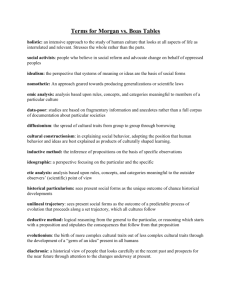cohen
advertisement
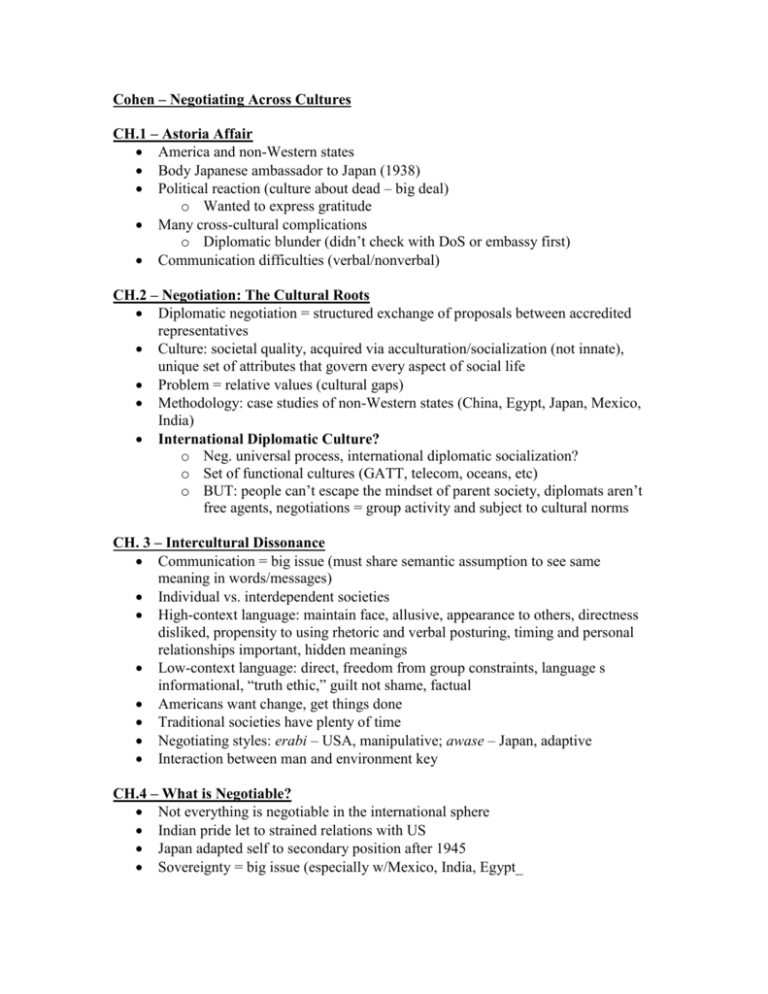
Cohen – Negotiating Across Cultures CH.1 – Astoria Affair America and non-Western states Body Japanese ambassador to Japan (1938) Political reaction (culture about dead – big deal) o Wanted to express gratitude Many cross-cultural complications o Diplomatic blunder (didn’t check with DoS or embassy first) Communication difficulties (verbal/nonverbal) CH.2 – Negotiation: The Cultural Roots Diplomatic negotiation = structured exchange of proposals between accredited representatives Culture: societal quality, acquired via acculturation/socialization (not innate), unique set of attributes that govern every aspect of social life Problem = relative values (cultural gaps) Methodology: case studies of non-Western states (China, Egypt, Japan, Mexico, India) International Diplomatic Culture? o Neg. universal process, international diplomatic socialization? o Set of functional cultures (GATT, telecom, oceans, etc) o BUT: people can’t escape the mindset of parent society, diplomats aren’t free agents, negotiations = group activity and subject to cultural norms CH. 3 – Intercultural Dissonance Communication = big issue (must share semantic assumption to see same meaning in words/messages) Individual vs. interdependent societies High-context language: maintain face, allusive, appearance to others, directness disliked, propensity to using rhetoric and verbal posturing, timing and personal relationships important, hidden meanings Low-context language: direct, freedom from group constraints, language s informational, “truth ethic,” guilt not shame, factual Americans want change, get things done Traditional societies have plenty of time Negotiating styles: erabi – USA, manipulative; awase – Japan, adaptive Interaction between man and environment key CH.4 – What is Negotiable? Not everything is negotiable in the international sphere Indian pride let to strained relations with US Japan adapted self to secondary position after 1945 Sovereignty = big issue (especially w/Mexico, India, Egypt_ Human rights rhetoric ignores “civilizational pluralism” (all societies aren’t individually oriented) CH.5 – Setting Out the Pieces: Prenegotiation 4 stages: preparation, beginning, middle, end Establish personal relationships (international relationship/personal ties) Preliminary visit to “improve mutual understanding” guanxi – Chinese personal relations (network, obligations – to West may seem corrupt, bribery) Outward appearance to be maintained at all costs (face) Avoid unknown (determine opponents position or establish enduring principles to stick with) Failure to do prenegotiation can lead to failure of negotiations CH.6 – Opening Moves Who goes first? o Lay out entire agenda or wait and do it gradually? Non-Western nations and US power changes things o Amae relationship (Japan) = US has responsibility to protect/help weaker party o Independence asserted (Mexico, Egypt – but still use the weakness card) o Weakness: sincere feeling or calculated tactic India and Chinese didn’t take on supplicant attitude o China didn’t have aid relationship with US o India received aid without giving a please or thank you (probably rooted in Hindu Dharma or duty – men with status don’t ask for charity, gratitude irrelevant) o Sense of obligation = intolerable Appeal to morality (as injury party) o India, China (debt rhetoric), Mexico o US annoyed by this Non-Western countries appeal to principle (vs. facts) o Don’t like to focus on the details but the axioms and philosophical concerns CH.7 – On Tactics and Players: Middle Game I Differences in time, authority, negotiation itself come into focus “Concession-convergence” for USA Differences in value of compromise: US too willing to compromise (use their BATNA a lot) Issues arise with contact between different types of institutions (different forms of bureaucracy) Hierarchical/patriarchal vs. individual governments o Broken promises because the US isn’t talking with the actual decision makers (the ministers or their counterparts may say they can do something but nothing ever happens – face saving) CH. 8 – Middle Game II Reasoning differences: inductive, deductive, emotional Problem vs. Relationship orientation Confidence, trust, personal relations important influences Pressure = futile Reluctant to say no (save face) o Japanese – “very difficult” o Egypt – “hate to turn you down” Direct vs. indirect Nonverbal communication = important o Sensitive to sign and symbol o Use of space, ceremony, facial expressions, gestures, etc o Ceremony plays central role CH. 9 – End Game Conceptions of time crucial during the end game Written vs. unwritten agreement (unwritten can save face) Pressures to settle: US impatient, non-Western doesn’t like pressure/negotiations against the clock Must learn to not be so impatient, slow the timetable CH. 10 – Conclusions Cross-cultural harmony possible in negotiations IF there are shared interests Must keep concerns of face at the forefront LESSONS: 1. Prepare to study culture and history (not just the issue at hand) 2. Warm, personal relationships important 3. Don’t assume understanding of any message either way 4. Notice nonverbal gestures/indirect cues 5. Be aware of importance of status and face 6. Don’t overestimate the power of advocacy 7. Adapt to cultural needs 8. Don’t compromise with yourself (don’t give away too much at first especially) 9. Be patient! 10. Agreement must be presentable (face) or need to supplement substantive losses with symbolic gains to make up for it
